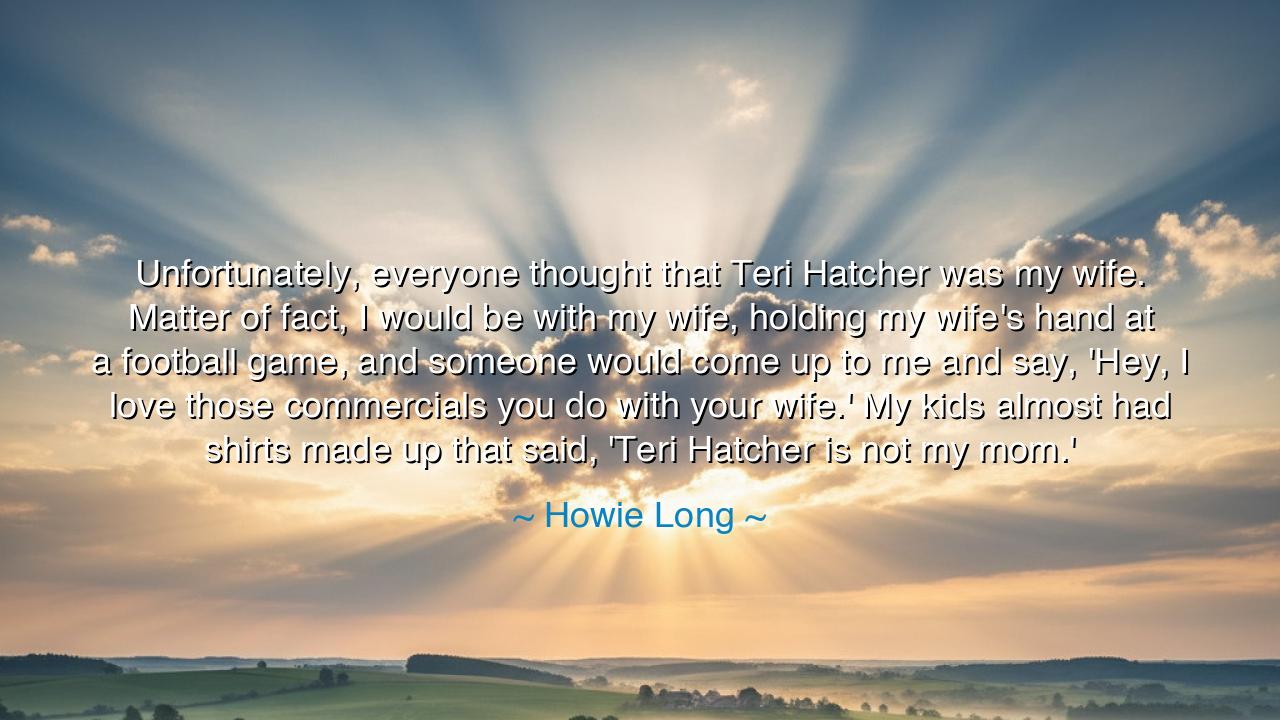
Unfortunately, everyone thought that Teri Hatcher was my wife.
Unfortunately, everyone thought that Teri Hatcher was my wife. Matter of fact, I would be with my wife, holding my wife's hand at a football game, and someone would come up to me and say, 'Hey, I love those commercials you do with your wife.' My kids almost had shirts made up that said, 'Teri Hatcher is not my mom.'






"Unfortunately, everyone thought that Teri Hatcher was my wife. Matter of fact, I would be with my wife, holding my wife's hand at a football game, and someone would come up to me and say, 'Hey, I love those commercials you do with your wife.' My kids almost had shirts made up that said, 'Teri Hatcher is not my mom.'" These words from Howie Long, the former NFL player turned commentator, offer more than just a humorous anecdote about mistaken identities; they reflect a deeper truth about the nature of perception and identity in the public eye. The world, especially in the age of mass media, often sees what it wants to see — not what is true. Howie Long’s experience is a powerful reminder that public personas are not always aligned with the reality of our private lives.
In the days of the ancients, the concept of identity was tied closely to one’s reputation and family honor. The Romans would often speak of a man’s virtus — his worth and integrity — which was judged by his actions, his role in his community, and his relationships. Honor was a sacred bond, and a man’s reputation was something to be guarded at all costs. Yet, the public’s perception was always shaped by what they saw, not what was true in the depths of a man’s life. As Julius Caesar once said, "The truth is what we make of it," and in the minds of the many, the truth was often molded by appearances, by what was put forth before them.
Howie Long’s experience with mistaken identity reminds us of the fragility of reputation in the eyes of the public. He speaks not of any personal hurt or distress, but rather of the curious way in which the public’s perception of who we are can sometimes distort our private lives. The commercials he did with Teri Hatcher — an actress known for her role on Desperate Housewives — became so intertwined with his own identity that even his own children had to make playful statements to correct the public’s mistake. This is a reflection of the modern age, where the line between reality and fiction often becomes blurred, and where the stories we tell ourselves and the images we project become intertwined.
Consider the case of King Solomon, the wise ruler of ancient Israel, who understood the power of perception and identity. In one famous story, two women came to him, both claiming to be the mother of the same child. Solomon, with his great wisdom, devised a test to reveal the truth — he proposed to divide the child in two, giving each woman a half. The true mother, unable to bear the thought of harm coming to her child, immediately offered to give up her claim in order to save the child’s life. Through this, Solomon saw that truth often requires selflessness, and that a person’s true identity is revealed not by external circumstances, but by their actions and their heart. In the modern world, as in Solomon’s time, our identity is often contested, misrepresented, or misperceived, but only through genuine actions can we reveal the truth of who we truly are.
Howie Long’s reflection also speaks to the role of family and love in shaping one’s true identity. Though the world may mistake his relationship with Teri Hatcher, it is his actual wife and children who are the heart of his life. The true bond of family cannot be replaced by the fleeting recognition of a public persona. The lesson here is profound: family is the foundation of our personal identity, and it is love that shapes us most powerfully, not the roles we play in front of a camera or the images that others project onto us.
As we move through life, let us remember that our worth and identity are defined by the bonds we create, by the love we give, and by the integrity we uphold in the face of external expectations. The public's view of us may be transient, shaped by the whims of perception and fleeting moments of fame, but the true measure of a person’s worth is found in their actions, in their relationships, and in the way they honor the love they share with those closest to them.
Thus, take heed: do not be swayed by the world’s fleeting judgments or misperceptions. Cultivate your identity with authenticity, with the love of your family, and with the knowledge that you are not what others see, but rather, what you create in the quiet and sacred spaces of your life. True identity is shaped by truth, and as the ancients knew well, the truest truth lies in the love we give and the honor we uphold in our lives.






AAdministratorAdministrator
Welcome, honored guests. Please leave a comment, we will respond soon